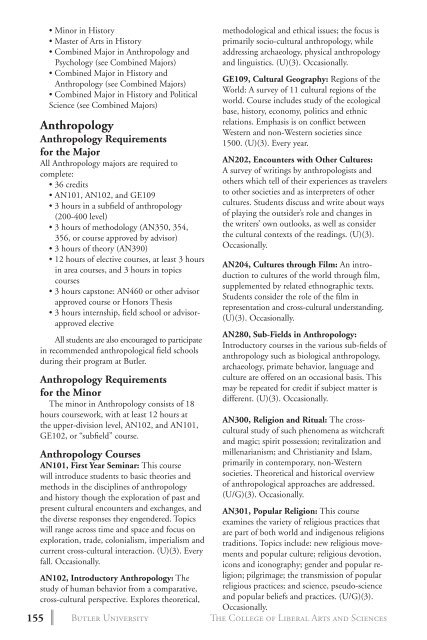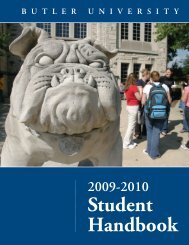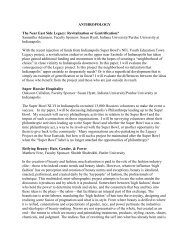2 0 1 3 bulletin - Butler University
2 0 1 3 bulletin - Butler University
2 0 1 3 bulletin - Butler University
You also want an ePaper? Increase the reach of your titles
YUMPU automatically turns print PDFs into web optimized ePapers that Google loves.
155<br />
• Minor in History<br />
• Master of Arts in History<br />
• Combined Major in Anthropology and<br />
Psychology (see Combined Majors)<br />
• Combined Major in History and<br />
Anthropology (see Combined Majors)<br />
• Combined Major in History and Political<br />
Science (see Combined Majors)<br />
Anthropology<br />
Anthropology Requirements<br />
for the Major<br />
All Anthropology majors are required to<br />
complete:<br />
• 36 credits<br />
• AN101, AN102, and GE109<br />
• 3 hours in a subfield of anthropology<br />
(200-400 level)<br />
• 3 hours of methodology (AN350, 354,<br />
356, or course approved by advisor)<br />
• 3 hours of theory (AN390)<br />
• 12 hours of elective courses, at least 3 hours<br />
in area courses, and 3 hours in topics<br />
courses<br />
• 3 hours capstone: AN460 or other advisor<br />
approved course or Honors Thesis<br />
• 3 hours internship, field school or advisorapproved<br />
elective<br />
All students are also encouraged to participate<br />
in recommended anthropological field schools<br />
during their program at <strong>Butler</strong>.<br />
Anthropology Requirements<br />
for the Minor<br />
The minor in Anthropology consists of 18<br />
hours coursework, with at least 12 hours at<br />
the upper-division level, AN102, and AN101,<br />
GE102, or “subfield” course.<br />
Anthropology Courses<br />
AN101, First Year Seminar: This course<br />
will introduce students to basic theories and<br />
methods in the disciplines of anthropology<br />
and history though the exploration of past and<br />
present cultural encounters and exchanges, and<br />
the diverse responses they engendered. Topics<br />
will range across time and space and focus on<br />
exploration, trade, colonialism, imperialism and<br />
current cross-cultural interaction. (U)(3). Every<br />
fall. Occasionally.<br />
AN102, Introductory Anthropology: The<br />
study of human behavior from a comparative,<br />
cross-cultural perspective. Explores theoretical,<br />
<strong>Butler</strong> <strong>University</strong><br />
methodological and ethical issues; the focus is<br />
primarily socio-cultural anthropology, while<br />
addressing archaeology, physical anthropology<br />
and linguistics. (U)(3). Occasionally.<br />
GE109, Cultural Geography: Regions of the<br />
World: A survey of 11 cultural regions of the<br />
world. Course includes study of the ecological<br />
base, history, economy, politics and ethnic<br />
relations. Emphasis is on conflict between<br />
Western and non-Western societies since<br />
1500. (U)(3). Every year.<br />
AN202, Encounters with Other Cultures:<br />
A survey of writings by anthropologists and<br />
others which tell of their experiences as travelers<br />
to other societies and as interpreters of other<br />
cultures. Students discuss and write about ways<br />
of playing the outsider’s role and changes in<br />
the writers’ own outlooks, as well as consider<br />
the cultural contexts of the readings. (U)(3).<br />
Occasionally.<br />
AN204, Cultures through Film: An introduction<br />
to cultures of the world through film,<br />
supplemented by related ethnographic texts.<br />
Students consider the role of the film in<br />
representation and cross-cultural understanding.<br />
(U)(3). Occasionally.<br />
AN280, Sub-Fields in Anthropology:<br />
Introductory courses in the various sub-fields of<br />
anthropology such as biological anthropology,<br />
archaeology, primate behavior, language and<br />
culture are offered on an occasional basis. This<br />
may be repeated for credit if subject matter is<br />
different. (U)(3). Occasionally.<br />
AN300, Religion and Ritual: The crosscultural<br />
study of such phenomena as witchcraft<br />
and magic; spirit possession; revitalization and<br />
millenarianism; and Christianity and Islam,<br />
primarily in contemporary, non-Western<br />
societies. Theoretical and historical overview<br />
of anthropological approaches are addressed.<br />
(U/G)(3). Occasionally.<br />
AN301, Popular Religion: This course<br />
examines the variety of religious practices that<br />
are part of both world and indigenous religions<br />
traditions. Topics include: new religious movements<br />
and popular culture; religious devotion,<br />
icons and iconography; gender and popular religion;<br />
pilgrimage; the transmission of popular<br />
religious practices; and science, pseudo-science<br />
and popular beliefs and practices. (U/G)(3).<br />
Occasionally.<br />
The College of Liberal Arts and Sciences
















